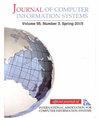企业人工智能采用强度与营销绩效
IF 2.5
4区 管理学
Q2 COMPUTER SCIENCE, INFORMATION SYSTEMS
引用次数: 0
摘要
摘要本研究探讨企业的人工智能(AI)采用强度,探讨其前因和后果。作者认为,技术机会主义、最高管理层的支持和规范压力是企业采用人工智能强度背后的主要驱动因素。采用动态能力的观点,他们进一步表明,高人工智能采用强度通过提高其动态营销能力来提高公司的营销绩效。根据营销经理、产品经理和品牌经理提供的226份有效回复数据,该研究表明,人工智能应用强度的提高显著提高了企业的营销绩效,增强了企业的营销能力,使其能够动态适应不断变化的市场格局。关键词:人工智能emiles - snow战略类型学动态能力营销绩效披露声明作者未报告潜在的利益冲突。其他信息资金数据收集由Marcus Jonathan Hunt基金会、Mike Loya工商管理基金会和德克萨斯大学埃尔帕索分校Mike Loya创新与商业中心资助。本文章由计算机程序翻译,如有差异,请以英文原文为准。
Firm AI Adoption Intensity and Marketing Performance
ABSTRACTThis study delves into a firm’s artificial intelligence (AI) adoption intensity, exploring both its antecedents and consequences. The authors posit that technological opportunism, top management support, and normative pressure are the primary drivers behind a firm’s AI adoption intensity. Adopting a dynamic capabilities perspective, they further suggest that high AI adoption intensity enhances a firm’s marketing performance by boosting its dynamic marketing capabilities. Drawing on data from 226 valid responses provided by marketing managers, product managers, and brand managers, the research reveals that increased AI adoption intensity significantly improves a firm’s marketing performance, empowering it with enhanced marketing capabilities to adapt dynamically to the ever-changing market landscape.KEYWORDS: Artificial intelligenceMiles-Snow strategic typologydynamic capabilitiesmarketing performance Disclosure statementNo potential conflict of interest was reported by the author(s).Additional informationFundingData collection was funded by the Marcus Jonathan Hunt endowment, the Mike Loya in Business Administration endowment, and the Mike Loya Center for Innovation and Commerce at the University of Texas at El Paso.
求助全文
通过发布文献求助,成功后即可免费获取论文全文。
去求助
来源期刊

Journal of Computer Information Systems
COMPUTER SCIENCE, INFORMATION SYSTEMS-
CiteScore
6.80
自引率
7.10%
发文量
82
审稿时长
>12 weeks
期刊介绍:
The Journal of Computer Information Systems (JCIS) aims to publish manuscripts that explore information systems and technology research and thus develop computer information systems globally.
We encourage manuscripts that cover the following topic areas:
-Analytics, Business Intelligence, Decision Support Systems in Computer Information Systems
- Mobile Technology, Mobile Applications
- Human-Computer Interaction
- Information and/or Technology Management, Organizational Behavior & Culture
- Data Management, Data Mining, Database Design and Development
- E-Commerce Technology and Issues in computer information systems
- Computer systems enterprise architecture, enterprise resource planning
- Ethical and Legal Issues of IT
- Health Informatics
- Information Assurance and Security--Cyber Security, Cyber Forensics
- IT Project Management
- Knowledge Management in computer information systems
- Networks and/or Telecommunications
- Systems Analysis, Design, and/or Implementation
- Web Programming and Development
- Curriculum Issues, Instructional Issues, Capstone Courses, Specialized Curriculum Accreditation
- E-Learning Technologies, Analytics, Future
 求助内容:
求助内容: 应助结果提醒方式:
应助结果提醒方式:


